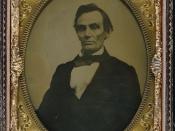Whether a person with average charisma could be considered a superior leader or not will depend on a number of factors. First, it is important to understand what factors constitute charisma, also known as "idealized influence" (Mumford & Strange, 2002) and by inference average charisma. Connelly, Gaddis and Helton-Fauth (2002) cited House (1977) to indicate that Charismatic leadership arises from the interaction of leader capacities (self confidence, dominance, moral conviction), leader behavior (successful role modeling one's beliefs and values, articulation of goals and visions, communicating high expectations, tapping into followers motives), followers characteristics (motive compatibility, identification with leader), and situational factors (crises, need for social change) (p. 257). In other words, charisma involves envisioning, energizing, and enabling and therefore a true commitment towards the overall well being of an organization and its employees.
Second, as one examines the relationship between charismatic leadership in general (weak or strong) and effectiveness, it should be realized that this is inherently a weak one (Nadler and Tushman, winter, 1990) as it has many associated risks and is limited by (1) unrealistic expectations, (2) dependency and counter-dependency (3) reluctance to disagree with the leader⦠and (4) limitations of range of the individual leader (pp.
110-111). As such, the authors concluded that while charismatic leadership is a necessary ingredient for effective [or superior] organizational performance, it is not sufficient (p. 112).
Still, these inherent limitations are even more compounded or reinforced as one begins to further analyze the relationship between charisma and the impact on leader effectiveness or performance, in the context of two basic types of charisma, "personalized and socialized", as described by House and Howell (1992) and cited by Connelly, Gaddis and Helton-Fauth (2002, p. 257). The authors suggested that charismatic leaders who epitomize the personalized behavior reflect a vision that is defined by...


